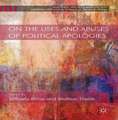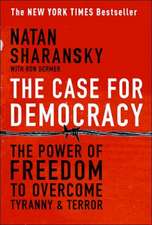Rhetoric in Neoliberalism: Rhetoric, Politics and Society
Editat de Kim Hong Nguyenen Limba Engleză Hardback – 11 noi 2016
| Toate formatele și edițiile | Preț | Express |
|---|---|---|
| Paperback (1) | 636.12 lei 6-8 săpt. | |
| Springer International Publishing – 23 iun 2018 | 636.12 lei 6-8 săpt. | |
| Hardback (1) | 640.71 lei 6-8 săpt. | |
| Springer International Publishing – 11 noi 2016 | 640.71 lei 6-8 săpt. |
Din seria Rhetoric, Politics and Society
-
 Preț: 178.02 lei
Preț: 178.02 lei -
 Preț: 346.34 lei
Preț: 346.34 lei - 20%
 Preț: 690.25 lei
Preț: 690.25 lei - 15%
 Preț: 699.45 lei
Preț: 699.45 lei - 15%
 Preț: 638.89 lei
Preț: 638.89 lei - 15%
 Preț: 696.50 lei
Preț: 696.50 lei -
 Preț: 390.63 lei
Preț: 390.63 lei -
 Preț: 389.88 lei
Preț: 389.88 lei -
 Preț: 385.62 lei
Preț: 385.62 lei -
 Preț: 386.61 lei
Preț: 386.61 lei - 15%
 Preț: 638.43 lei
Preț: 638.43 lei - 18%
 Preț: 781.62 lei
Preț: 781.62 lei - 15%
 Preț: 645.14 lei
Preț: 645.14 lei - 18%
 Preț: 891.02 lei
Preț: 891.02 lei - 15%
 Preț: 584.76 lei
Preț: 584.76 lei - 9%
 Preț: 635.93 lei
Preț: 635.93 lei - 18%
 Preț: 1004.36 lei
Preț: 1004.36 lei - 15%
 Preț: 696.82 lei
Preț: 696.82 lei - 18%
 Preț: 1004.00 lei
Preț: 1004.00 lei - 15%
 Preț: 641.20 lei
Preț: 641.20 lei - 15%
 Preț: 697.65 lei
Preț: 697.65 lei - 18%
 Preț: 778.76 lei
Preț: 778.76 lei -
 Preț: 479.29 lei
Preț: 479.29 lei -
 Preț: 483.70 lei
Preț: 483.70 lei - 18%
 Preț: 886.43 lei
Preț: 886.43 lei - 18%
 Preț: 781.62 lei
Preț: 781.62 lei - 9%
 Preț: 676.90 lei
Preț: 676.90 lei -
 Preț: 352.80 lei
Preț: 352.80 lei - 18%
 Preț: 897.14 lei
Preț: 897.14 lei
Preț: 640.71 lei
Preț vechi: 753.77 lei
-15% Nou
Puncte Express: 961
Preț estimativ în valută:
122.60€ • 128.00$ • 101.47£
122.60€ • 128.00$ • 101.47£
Carte tipărită la comandă
Livrare economică 04-18 aprilie
Preluare comenzi: 021 569.72.76
Specificații
ISBN-13: 9783319398495
ISBN-10: 3319398490
Pagini: 243
Ilustrații: X, 234 p.
Dimensiuni: 148 x 210 x 19 mm
Greutate: 0.43 kg
Ediția:1st ed. 2017
Editura: Springer International Publishing
Colecția Palgrave Macmillan
Seria Rhetoric, Politics and Society
Locul publicării:Cham, Switzerland
ISBN-10: 3319398490
Pagini: 243
Ilustrații: X, 234 p.
Dimensiuni: 148 x 210 x 19 mm
Greutate: 0.43 kg
Ediția:1st ed. 2017
Editura: Springer International Publishing
Colecția Palgrave Macmillan
Seria Rhetoric, Politics and Society
Locul publicării:Cham, Switzerland
Cuprins
Acknowledgements.- Rhetoric in Neoliberalism; Kim Hong Nguyen.- Chapter 1: Accountable to Whom? The Rhetorical Circulation of Neoliberal Discourse and its Ambient Effects on Higher Education; Phillip Goodwin, Katrina Miller, and Catherine Chaput.- Chapter 2: Warren Buffett’s Celebrity, Epideictic Ethos, and Neoliberal Humanitarianism; Mark Meister and Carrie Anne Platt.- Chapter 3: Rhetorical Agency in a Neoliberal Age: Foucault, Power, Agency and Ethos; Robert Danisch.- Chapter 4: The Capable American: Ethos, Pathos, and the Governance of Education; Samuel Jay.- Chapter 5: Constitutive Rhetoric in the Age of Neoliberalism; David Seitz and Amanda Tennant.- Chapter 6: Branding Citizens: The Logic(s) of A Few Bad Apples; Jennifer Wingard.- Chapter 7: The Psychotic Discourse of 9/11 Truth; Jodi Dean.- Chapter 8: Computational Culture and the New Platonism in Neoliberal Rhetoric; Gerald Voorhees.- Afterword; Bradford Vivian.
Notă biografică
Kim Hong Nguyen is Assistant Professor of Speech Communication at University of Waterloo, Canada. Her research interests include rhetorical theory and criticism and cultural studies. Her work has appeared in Children’s Literature Association Quarterly, Howard Journal of Communications, and Cultural Politics.
Textul de pe ultima copertă
This volume examines and applies classical and contemporary concepts of rhetorical theory and criticism to the context of late capitalism. Each contributor shows how discourse, its subjects, and power relations are irrevocably transformed by neoliberalism. The collection analyzes a range of discourses and phenomena in neoliberalism including: higher education reforms, computational culture, Occupy Wall Street protests, the activism of Warren Buffett, and the 9-11 Truth Movement. Together, these chapters explore the contemporary rhetorical production of homo economicus and the various ways in which neoliberalism has become a way of thinking, orienting, and organizing all aspects of life around economized metrics of individualized and individuated success. This book will be of use to students and scholars crossing the fields of media and communication, political science, and sociology.
Caracteristici
Opens up new avenues for the analysis and critique of neoliberalism Cover three areas within rhetorical studies: it rhetorically situates the subject in neoliberalism, it expands the context of ethos for neoliberalism, and it economizes deliberation Explores how subjects engage in rhetorical practices that normalize and/or resist cultural logics of neoliberalism











